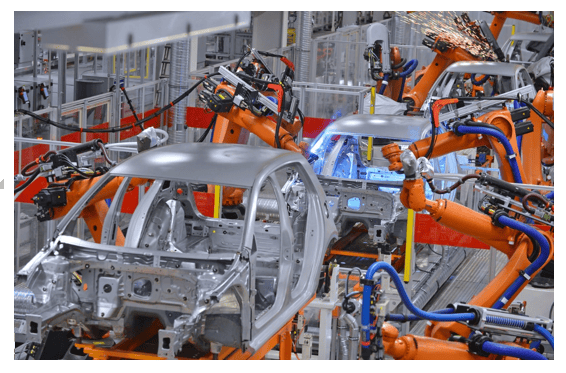- Home
- About Us
- Industry
- Services
- Reading
- Contact Us
Global Automotive Robotics Market is expected to foresee steady growth. Asia Pacific holds the largest share!
Author: Vikas Kumar
May 31, 2022

Global Automotive Robotics Market is expected to grow at a CAGR of around ~12% during the forecast period 2021-2027. Automobile manufacturers are incorporating robotics into their manufacturing processes because robots provide numerous benefits on the production line, including enhanced precision, efficiency, flexibility, and reliability. Because of this widespread adoption of automotive robotics, the automobile industry has become the world’s most automated industry and one of the greatest users of industrial robots. Furthermore, automotive manufacturing robots provide a competitive advantage to automotive firms by improving quality, increasing capacity, lowering warranty costs, and protecting workers from tough and dangerous duties. Furthermore, automotive robotics are mostly used in automobile assembly factories for applications such as spot welding, painting, and other similar tasks; however, there are several other applications for automotive robotics across the supply chain.
For a detailed analysis of the market, drivers browse through https://univdatos.com/report/automotive-robotics-market/
With the tremendous expansion of the automotive industry, there has been an increase in demand for industrial robots to simplify complicated production processes, which is driving the market growth. Automotive robots help to improve quality and productivity while lowering costs, which is fueling industry growth. Another growth-inducing aspect is the growing worry about employee safety as a result of the increasing number of injuries, manual errors, and accidents caused by working in hazardous settings in the car manufacturing business. This is bolstered by substantial financing and a slew of favorable initiatives by government agencies throughout the world to incorporate new gadgets and equipment to assure worker safety while adhering to safety regulations. Rapid technical improvements, such as the integration of the Internet of Things (IoT), cloud solutions, and autonomous intelligent vehicles (AIVs) for safely transporting components and materials from one location to another, are further driving market expansion. Other factors, such as strategic collaborations among key players, rising vehicle production due to rising disposable incomes in emerging economies, and rising research and development (R&D) investments for introducing energy-efficient automotive robots, are all contributing to the market’s positive outlook.
For a detailed analysis of the Covid-19 Impact on the market browse through https://univdatos.com/get-a-free-sample-form-php/?product_id=20669
COVID-19 and the ensuing shutdowns in all major markets were exacerbated by the automotive industry, which was already experiencing weak growth. In 2020, all automakers and tier players will see a decrease in car and component production and sales. The COVID-19 epidemic has presented the automotive industry with various issues. Among the main industrialized economies, South Korea, Italy, and Japan are the most affected. As a result, 80 percent of automotive and associated companies expected Coronavirus to have a direct impact on revenue in 2020. 78 percent of businesses lack sufficient personnel to run a full production line. However, China is responsible for more than 80% of the global car supply chain. China’s car sales dropped by 18% in January 2020. Initial concerns about a halt in Chinese parts exports swiftly morphed into widespread factory outages across Europe. Assembly plant closures in the United States added to the mounting pressure on an increasingly distressed global supply chain, where companies are at risk of defaulting on covenants, prompting banks to intervene. The pandemic’s exogenous shock exacerbates a worldwide demand downturn, which will likely lead to greater M&A activity as possibilities for sector consolidation emerge for private equity firms.
Request for a sample of the report browse throughhttps://univdatos.com/get-a-free-sample-form-php/?product_id=20669
For a better understanding of the market adoption of the Automotive Robotics, the market is analyzed based on its worldwide presence in the countries such as North America (United States, Canada, Rest of North America), Europe (Germany, France, UK, Italy, and Rest of Europe), Asia-Pacific (China, Japan, India, South Korea, Rest of APAC), and Rest of World. During the forecast period, Asia-Pacific is expected to hold the largest share as it is the world’s fastest-growing area, with countries like India, China, Taiwan, and South Korea emerging as regional leaders. Leading vendors such as ABB and KUKA are establishing operations in the region. Furthermore, government laws and subsidies have aided infrastructure improvement projects. These factors have positioned APAC as the preferred automobile manufacturing hub, driving the automotive robotic market. In terms of growth, China and India are the most developed countries in Asia-Pacific, and many sectors, like automotive, electronics, and aviation, are opening facilities in these countries, creating demand for automotive robots and making Asia-Pacific an expanding region.
Global Automotive Robotics Market Segmentation
Market Insight, by Component
- Controller
- Robotic arm
- End effector
- Sensors
- Drive
- Others
Market Insight, by Type
- Articulated
- Cylindrical SCARA
- Cartesian
- Others
Market Insight, by Application
- Welding
- Painting
- Cutting
- Material Handling
- Others
Market Insight, by Region
- North America Automotive Robotics Market
- United States
- Canada
- Rest of North America
- Europe Automotive Robotics Market
- Germany
- France
- United Kingdom
- Italy
- Rest of Europe
- Asia Pacific Automotive Robotics Market
- China
- Japan
- India
- South Korea
- Rest of Asia-Pacific
- Rest of World Automotive Robotics Market
Top Company Profiles
- Kawasaki Heavy Industries, Ltd
- Fanuc Corporation
- Yaskawa Electric Corporation
- Abb Ltd
- Comau SPA
- Nachi-Fujikoshi Corp
- Rockwell Automation, Inc
- Seiko Epson Corporation
- Denso Wave Incorporated
- Kuka Ag
Get a Callback
